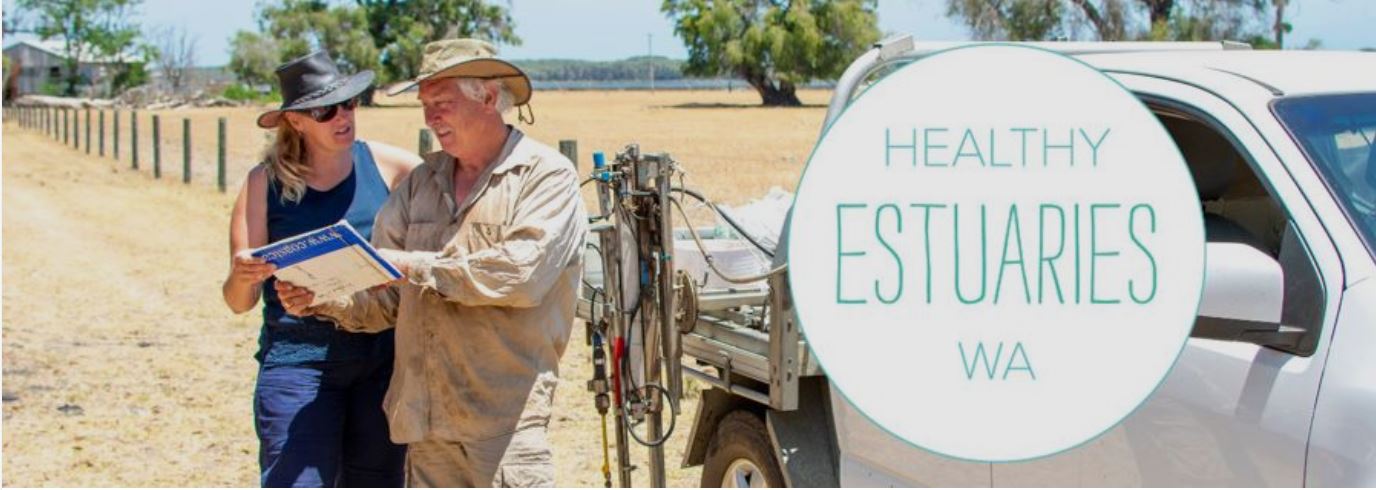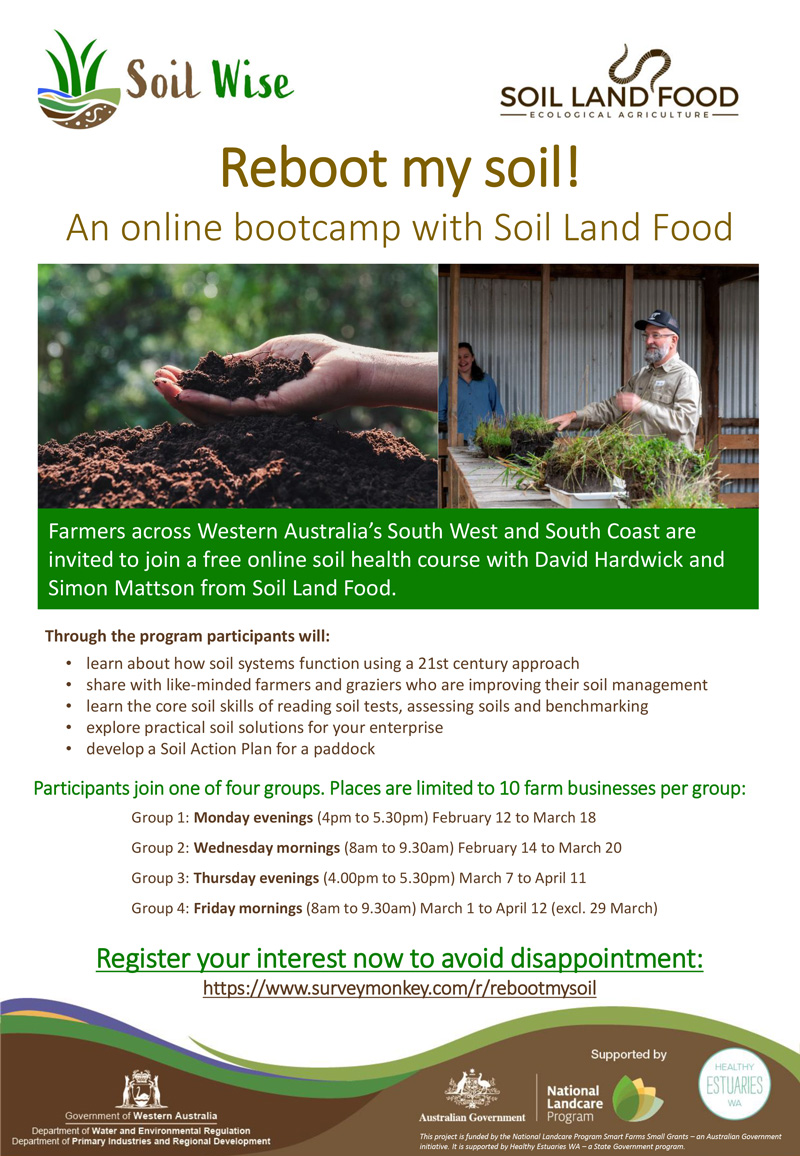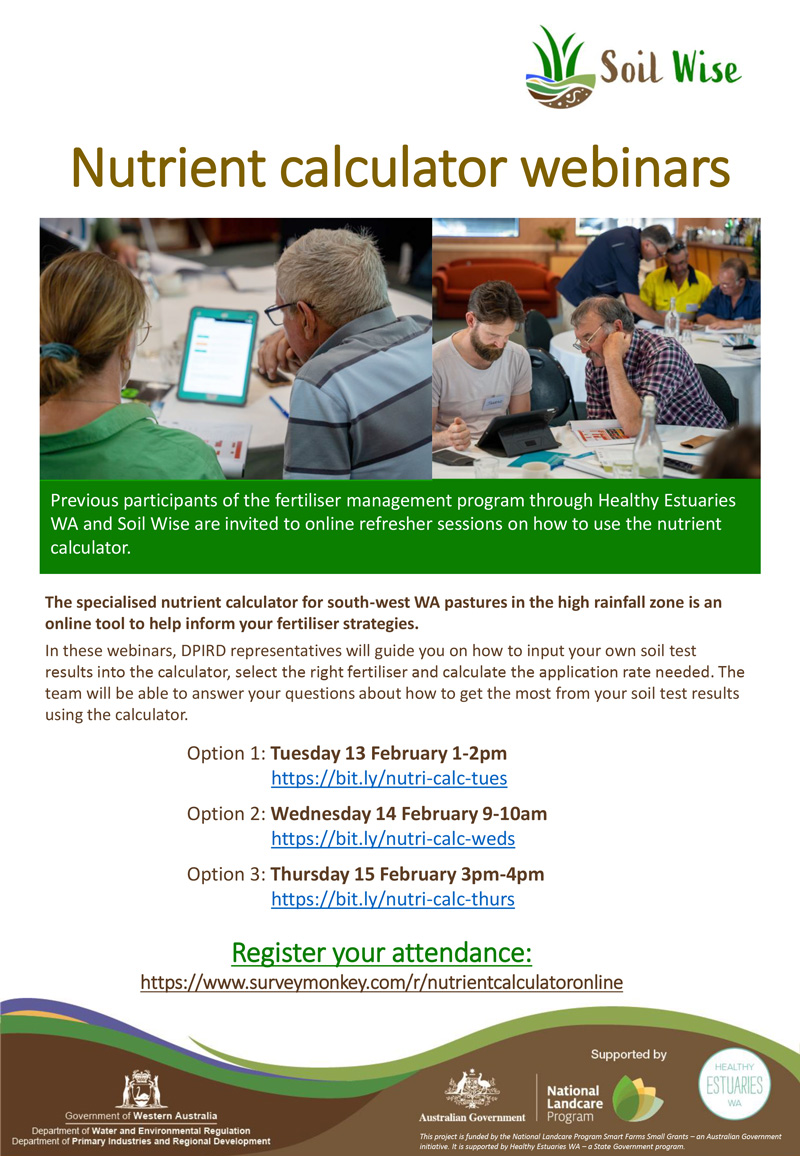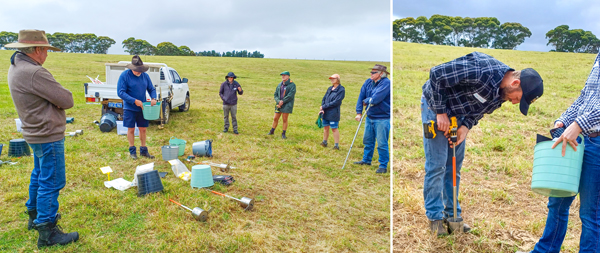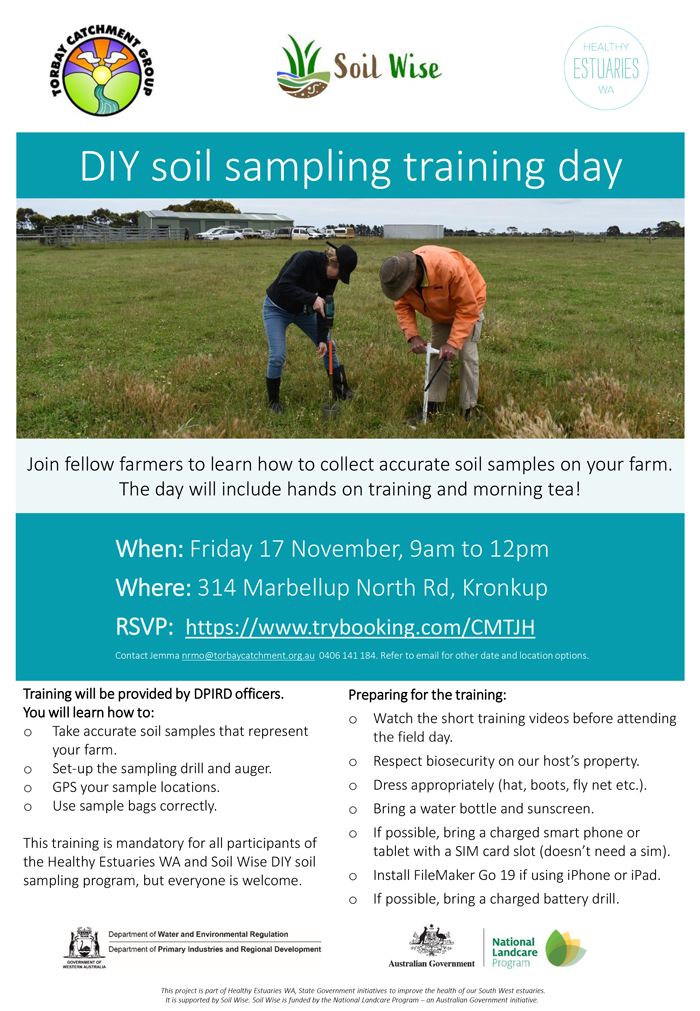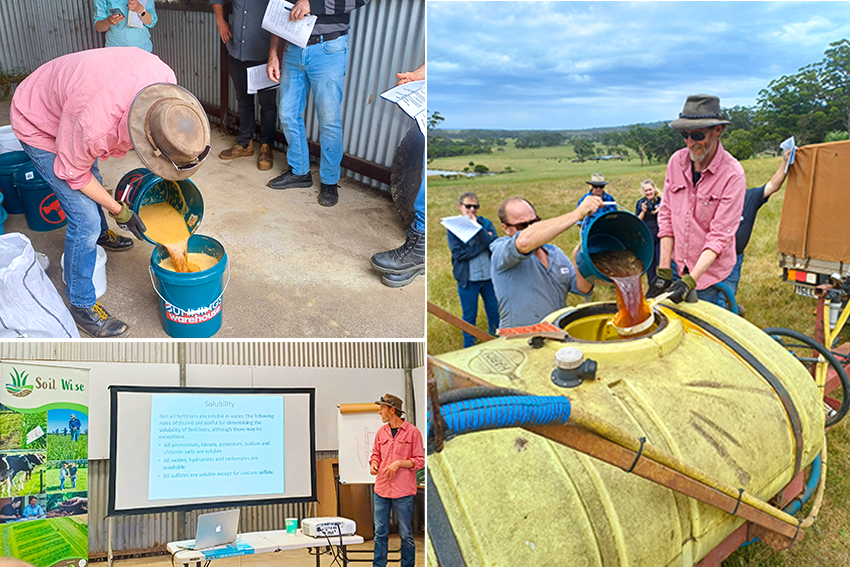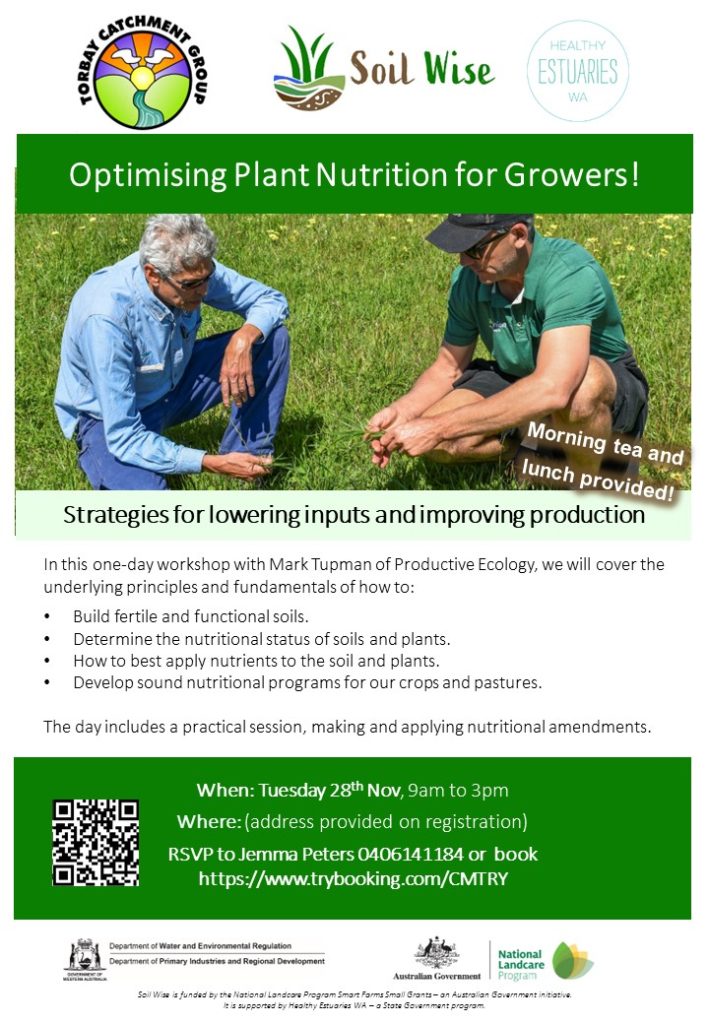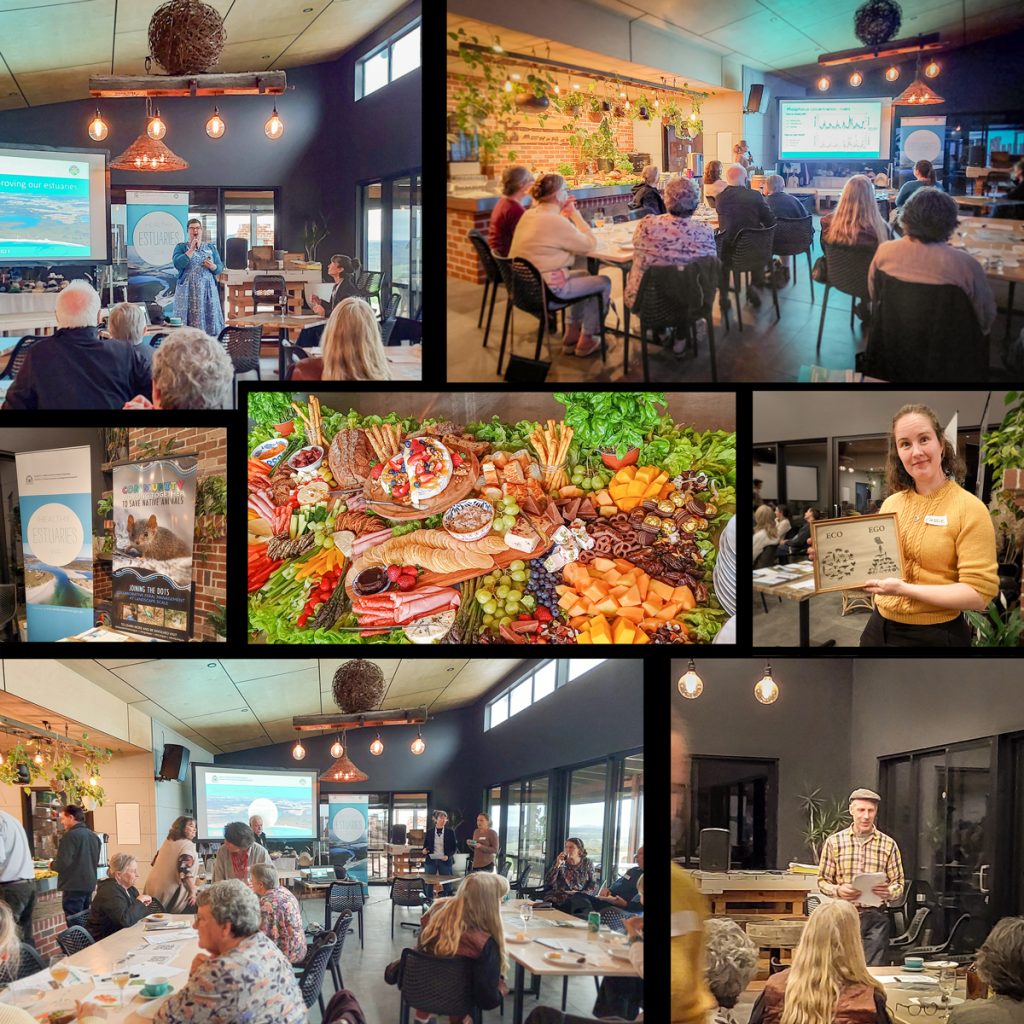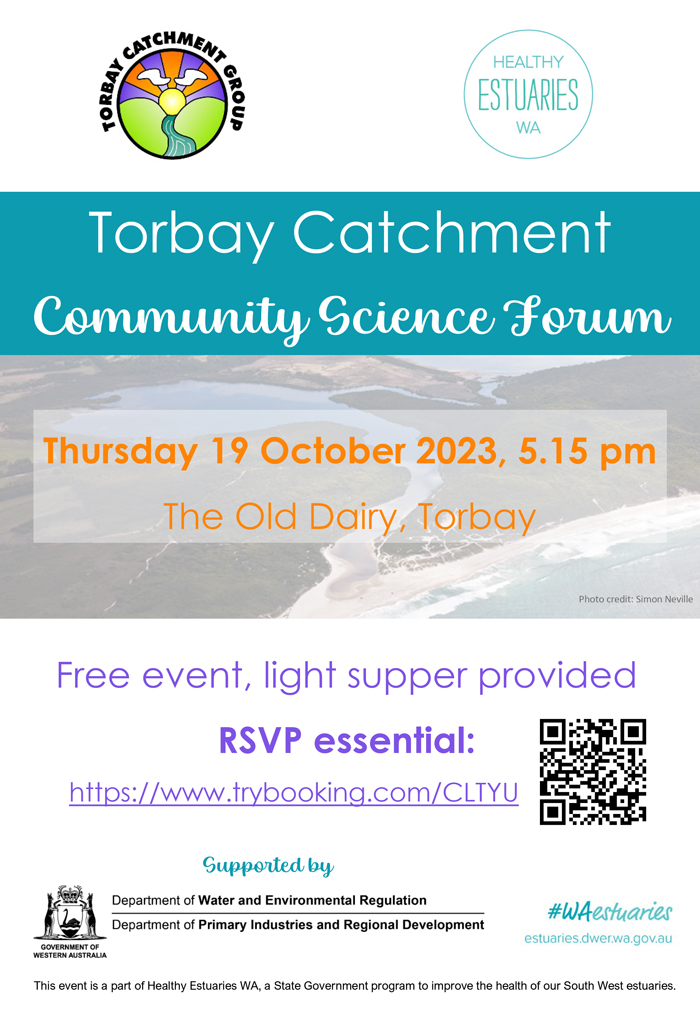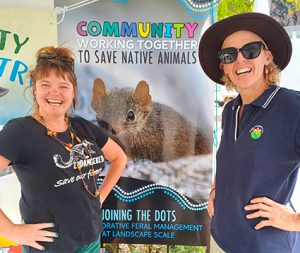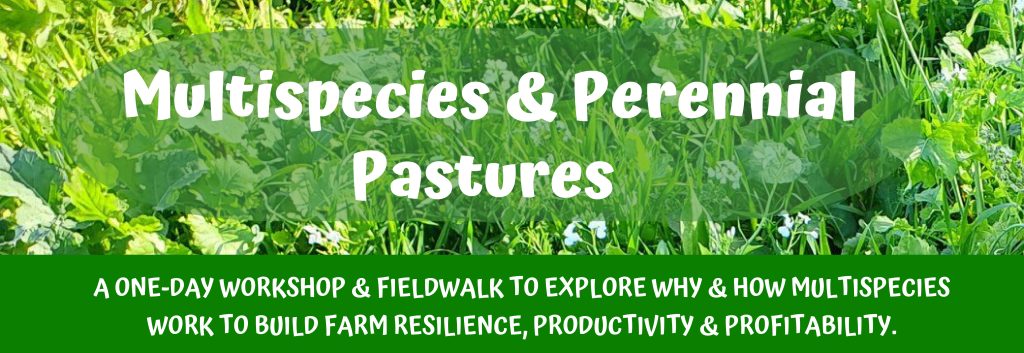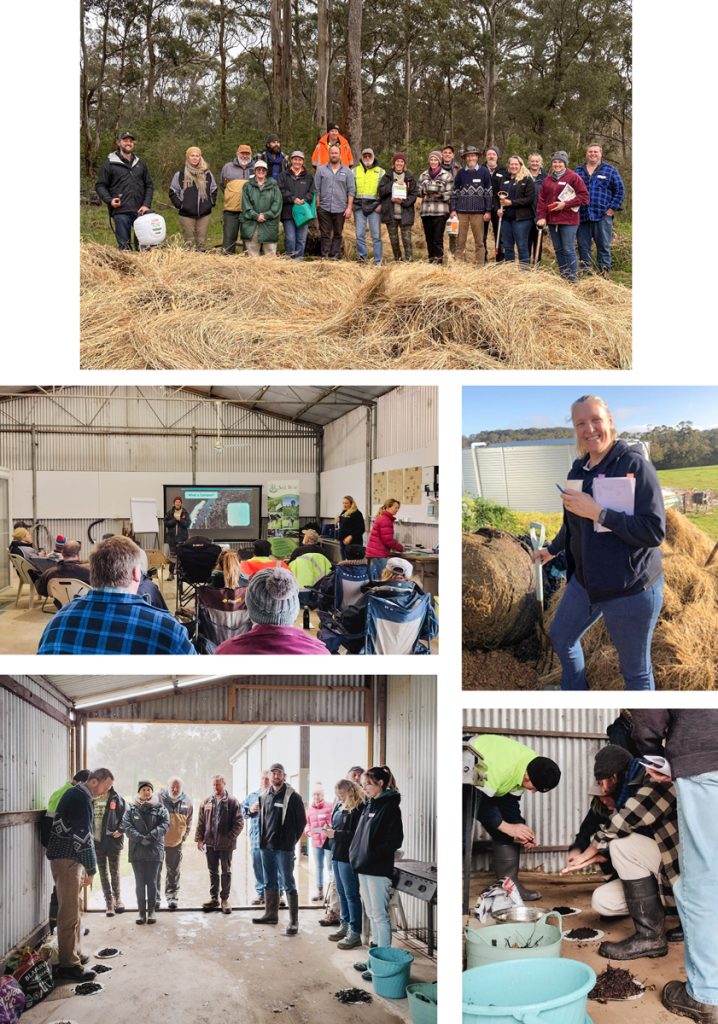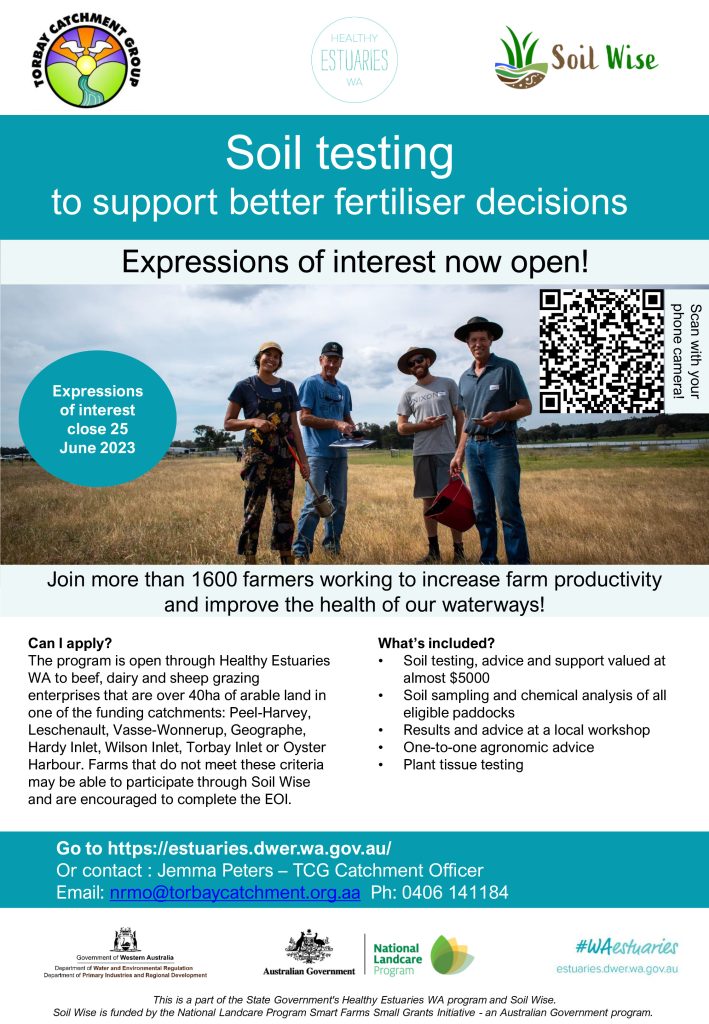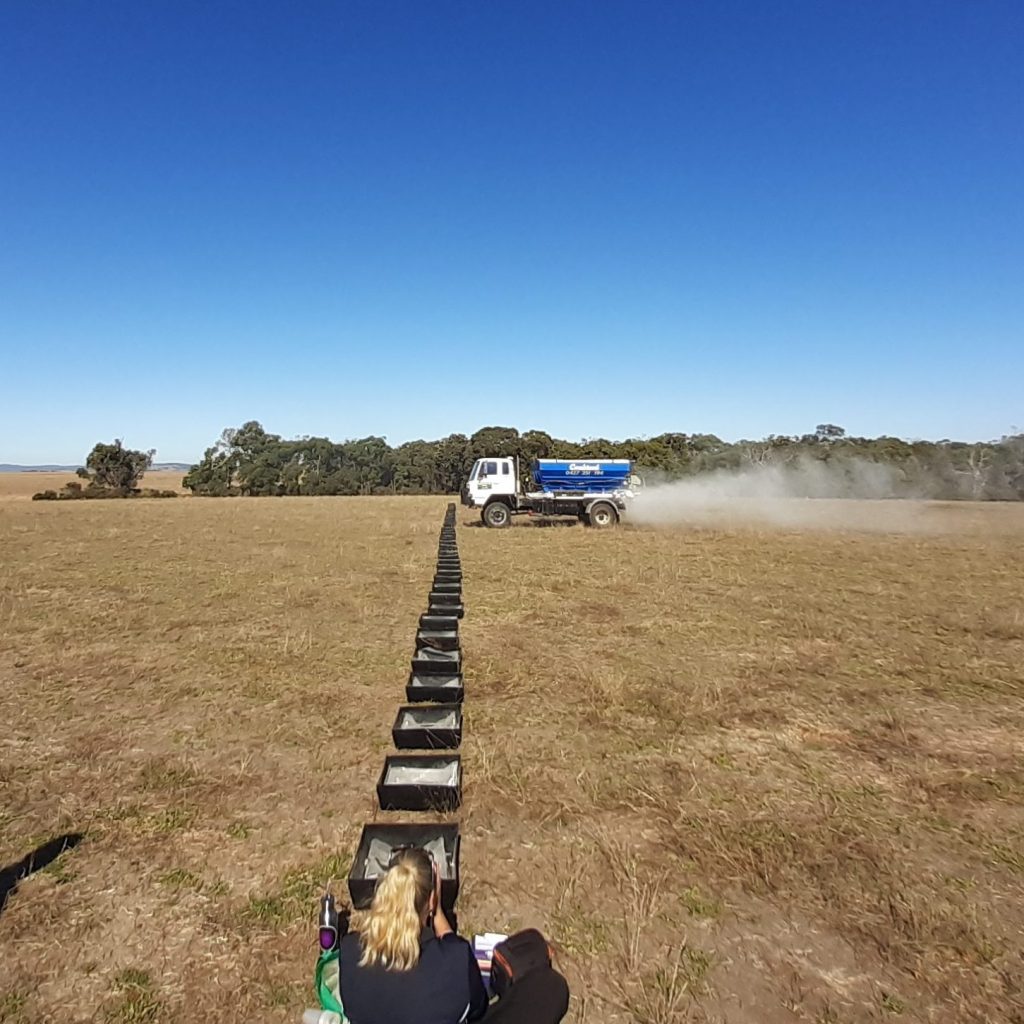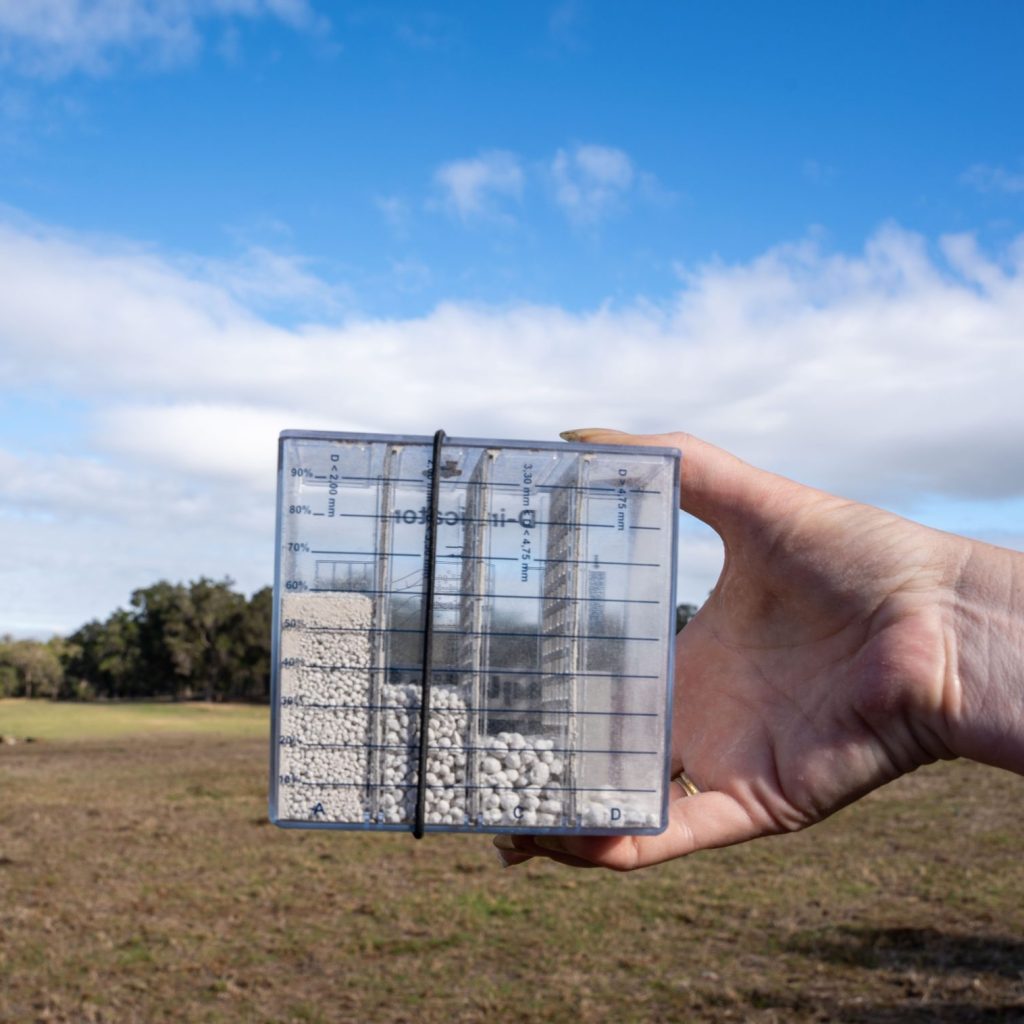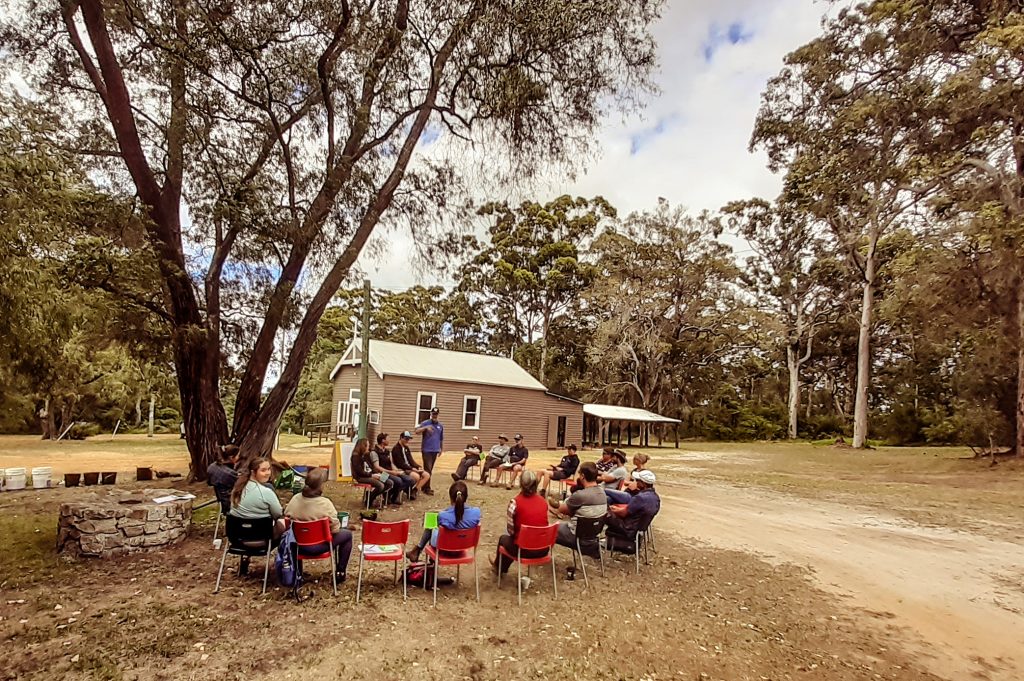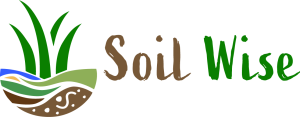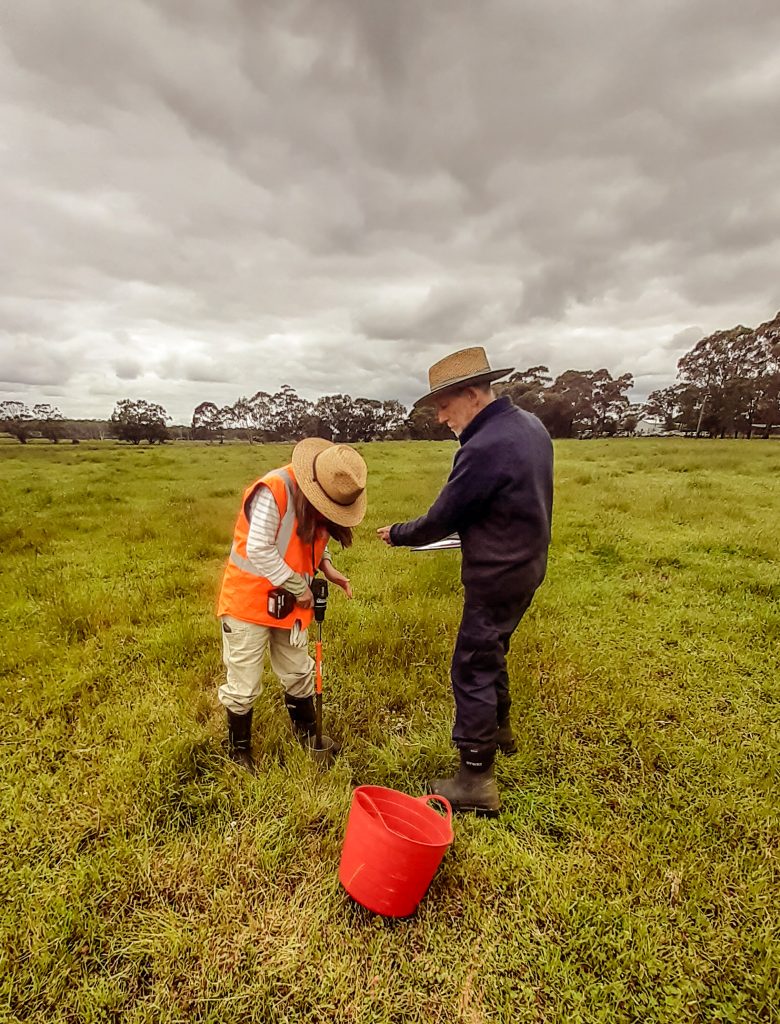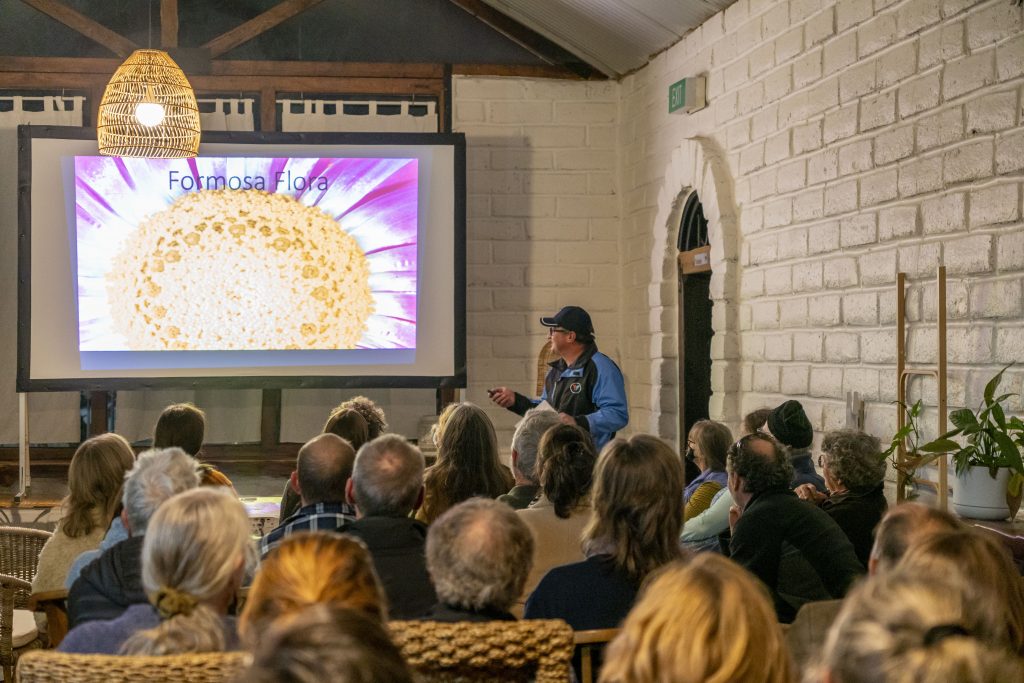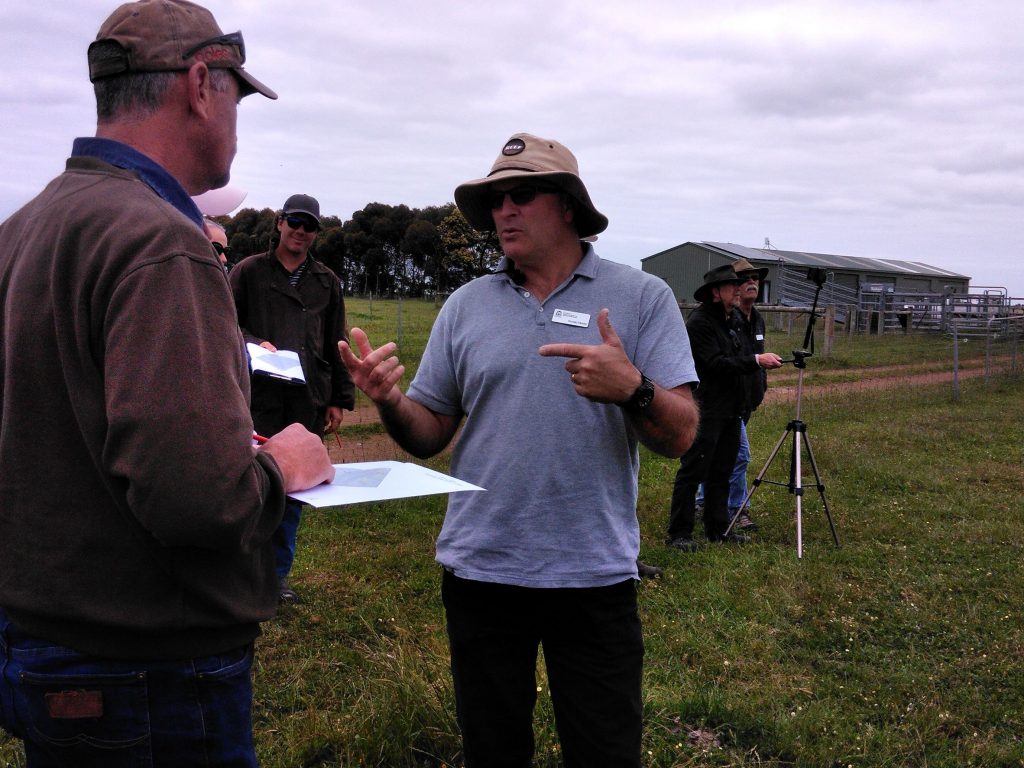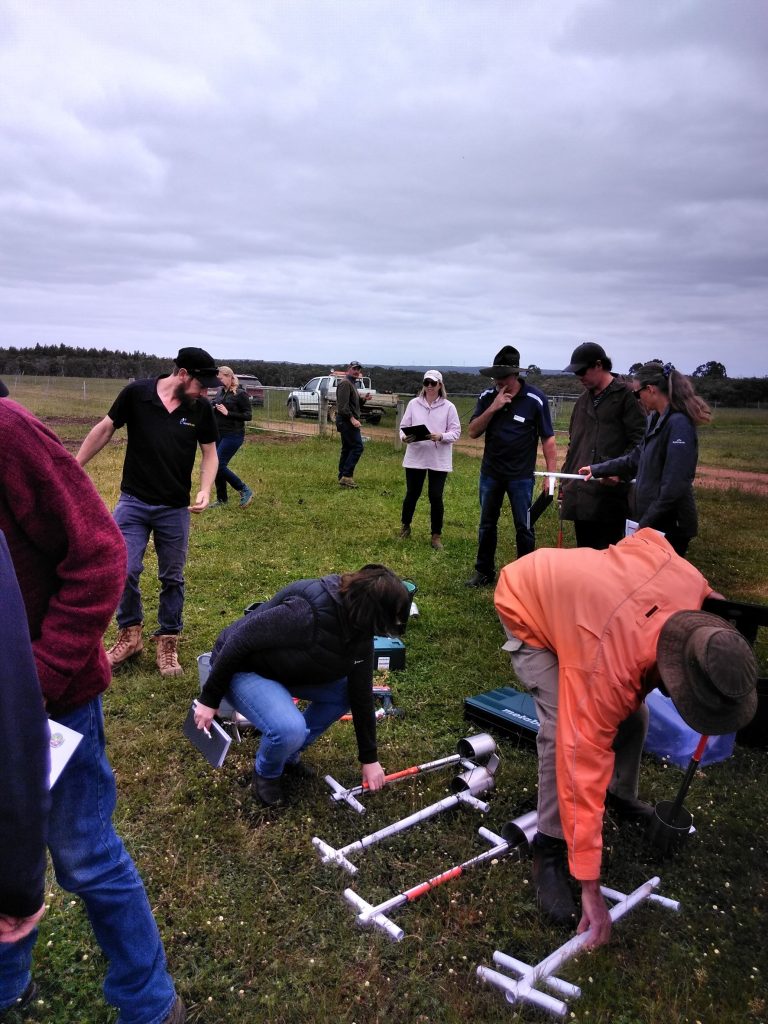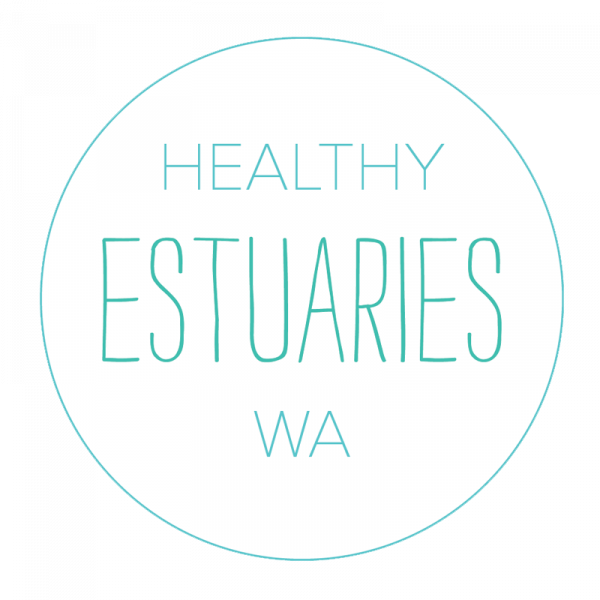Healthy Estuaries WA
Healthy Estuaries WA coordinates and implements common actions across at-risk estuaries, building regional capability, promoting whole-of-industry engagement, and strengthening cooperative networks to share resources and knowledge.
The program will include work to reduce nutrient inputs from priority catchments, use the latest science to monitor and effectively manage waterways, and continue to build collaboration between community, scientists, government and industry.
Torbay Catchment Group has partnered with Healthy Estuaries WA and is delivering on-ground actions for Torbay farmers as a part of the Sustainable Agriculture Strategy.
Through the fertiliser management program, farmers have access to soil testing, pasture tissue testing and one-on-one agronomic advice across their whole farm.
Feedback from one of our farmers: “What can I say…, as a farm the Healthy Estuaries Soil Testing Program continues to be of great value to us. The program provides the farmer with a ‘complete farm soil test picture’ that allows us to understand and tweak our soil and fertilizer program in an environmentally friendly manner. A small farmer would typically not be viably able to obtain such a detailed soil analysis. This, coupled with the support, feedback and subsequent knowledge gain provided by the Dept of Primary Industries through the Torbay Catchment Group has been a complete success for us.”
More information about the soil testing program can be found here.
Recent HEWA publications on the Torbay catchment can be accessed here
Updates
March 2024

Welcome to our first Estuary Echo of 2024 and what a busy start to the year!
Summer sees the Healthy Estuaries WA team delivering soil test results to farmers, conducting water quality treatment trials and completing seagrass monitoring.
In case you missed it, our scientists have been featured in the media for their work on a phosphorus-binding clay trial in a lake in the Peel-Harvey catchment ‒ take a look at the coverage from the ABC and GWN.
On March 1 we celebrated World Seagrass Day, collaborating with other researchers and community organisations to collect seagrass seeds for potential restoration in the Leschenault Estuary.
Coming up in March, farmers are invited to demonstration days to learn how to calibrate their fertiliser spreaders. You can also join one-on-one sessions with agronomists and officers from the Department of Primary Industries and Regional Development to learn how to use a specialised nutrient calculator to calculate fertiliser requirements.
If you’re on Facebook, make sure to like and follow our Healthy Estuaries WA page for program updates from across south-west WA.
In the spotlight
Farmers join forces for healthier waterways across South West WA
A record number of farms are participating in this year’s Healthy Estuaries WA and Soil Wise fertiliser management program, which is improving the health of our waterways while helping farmers make significant savings. Media release
Sowing new solutions for seagrass
This World Seagrass Day, seagrass scientists from the Department of Water and Environmental Regulation are not only celebrating successful Healthy Estuaries WA summer seagrass surveys in three estuaries, but also sowing the seeds of a new collaboration. Full story
Innovative clay trial improves water quality
An innovative new trial is helping to improve water quality in the Peel-Harvey estuary catchment by reducing the nutrients that fuel algal growth. Media release ABC story GWN story
Shedding light on Nullaki seagrasses
Scientists from the Department of Water and Environmental Regulation took to the water and sky to monitor seagrass in Nullaki (Wilson Inlet). Full story
New knowledge hub and online community for farmers
Lower Blackwood LCDC has launched “Talkin After Hours”, a new online community packed full of knowledge, case studies and ideas. Talkin’ After Hours is supported by Soil Wise and is available to all South West and South Coast farmers. See more
New data available on Booiyup and Yakamia Creek!
Booiyup (also known as Centennial Park Wetland) was built by the City of Albany in partnership with the Regional Estuaries Initiative in 2020. Water quality monitoring in the years since the wetland was constructed is showing that it is successfully treating flows, with data showing a substantial improvement in water quality. You can explore the data yourself on our new interactive online dashboard! See more
New publications
Looking for publications related to our estuaries? Check out our publications library!
Last Friday (1st March) we hosted the ‘Grow your Pasture profits’ soil test results workshop @ Bornholm hall. It was super informative and interesting!
Thanks to the legends at Department of Water and Depart of Primary Industries. We love being part of Healthy Estuaries WA!
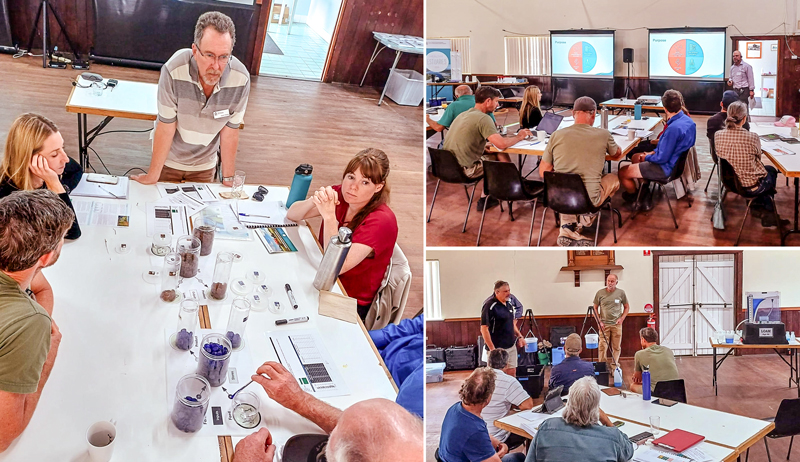

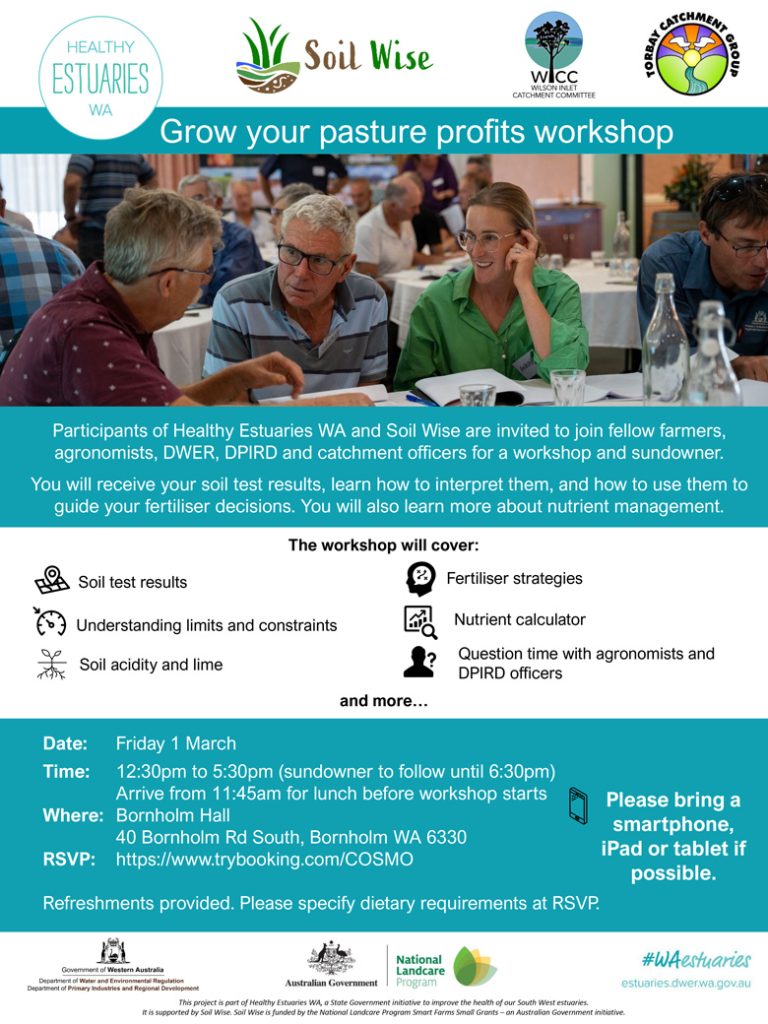
February 2024
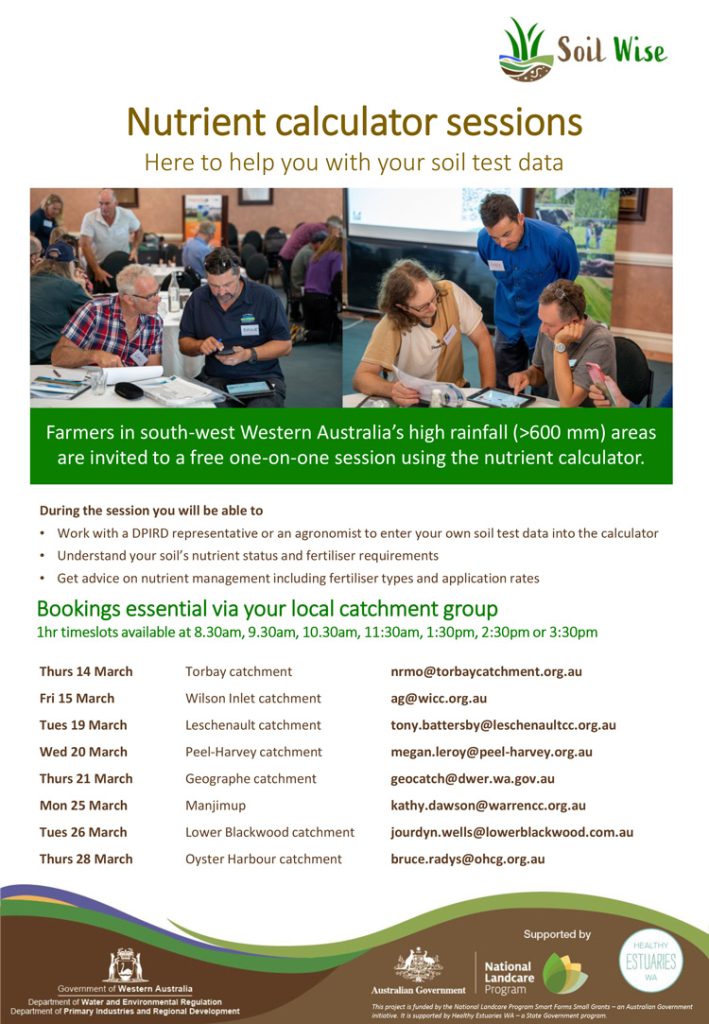
Farmers in south-west Western Australia’s high rainfall (>600 mm) areas are invited to a free one-on-one session using the nutrient calculator.
During the session you will be able to:
• Work with a DPIRD representative or an agronomist to enter your own soil test data into the calculator
• Understand your soil’s nutrient status and fertiliser requirements
• Get advice on nutrient management including fertiliser types and application rates
Bookings essential via your local catchment group: nrmo@torbaycatchment.org.au
1hr timeslots available at 8.30am, 9.30am, 10.30am, 11:30am, 1:30pm, 2:30pm or 3:30pm
Would you like to learn how to regenerate your soil’s health? Join the Reboot My Soil Online Bootcamp!
Soils are one of your farm business’ most important assets. The Soil Wise program is offering a free online course delivered by Soil Land Food to provide professional support to help you on your soil health journey.
Through the ‘Reboot my soil’ online program participants will:
- learn about how soil systems function using a 21st century approach
- share with like-minded farmers and graziers who are improving their soil management
- learn the core soil skills of reading soil tests, assessing soils and benchmarking
- explore practical soil solutions for your enterprise
- develop a Soil Action Plan for a paddock.
The course consists of 6 online sessions on Zoom (90 minutes each), run once a week over 6 weeks (see dates in the table below). Participants are expected to commit to attend all six sessions of the program.
All farm businesses are welcome to express your interest in the course. Places are strictly limited to 10 farm businesses per group. This is so participants have time to ask questions, share and learn with other participants and look at different soils.
Hosted by David Hardwick and his colleague Simon Mattsson from Soil Land Food. https://soillandfood.com.au/about-us/
Register your interest here: https://www.surveymonkey.com/r/rebootmysoil
Places are limited, so register early to avoid disappointment!
If you have any questions about the course, please contact estuary@dwer.wa.gov.au
Join one of four groups on the following dates/times:
| Group 1: | Monday evenings (4.00-5.30pm) | February 12, 19, 26 and March 4, 11, 18 |
| Group 2: | Wednesday mornings (8.00-9.30am) | February 14, 21, 28 and March 6, 13, 20 |
| Group 3: | Thursday afternoons (4.00-5.30pm) | March 7, 14, 21, 28 and April 4, 11 |
| Group 4: | Friday mornings (8.00-9.30am) | March 1, 8, 15, 22 and April 5, 12 (no session on Good Friday – 29 March) |
This program is free! This is made possible with funding from Soil Wise, through the Department of Water and Environmental Regulation. Soil Wise is funded by the National Landcare Program Smart Farms Small Grants – an Australian Government initiative. It is supported by Healthy Estuaries WA – a State Government program.
Previous participants of the fertiliser management program through Healthy Estuaries WA and Soil Wise are invited to online refresher sessions on how to use the nutrient calculator.
The specialised nutrient calculator for south-west WA pastures in the high rainfall zone is an online tool to help inform your fertiliser strategies.
In these webinars, DPIRD representatives will guide you on how to input your own soil test results into the calculator, select the right fertiliser and calculate the application rate needed. The team will be able to answer your questions about how to get the most from your soil test results using the calculator.
There are three options for the webinar:
- Tuesday 13 February 1-2pm
- Wednesday 14 February 9-10am
- Thursday 15 February 3pm-4pm
Register your attendance: https://www.surveymonkey.com/r/nutrientcalculatoronline
November 2023
In November we had our DIY Soil Sampling Training Day where we learnt how to take samples of our soil, send them to the lab and upload the data to farm maps.
Below are short YouTube training videos to help with your DIY soil sampling:
Soil sampling (8 mins 18 secs)
Sampler calibration (3 mins 29 secs)
Hazards and transects (55 secs)
Capturing GPS points (4 mins 57 secs)
28th Nov – Optimising Plant Nutrition for Growers w/ Mark Tupman from Productive Ecology.
We had the fabulous Mark Tupman join us for a workshop on soil health and optimising plant nutrition for growers.
We learnt all about the micro biome of soil and why it is so important for the future of farming and the health of pastures, animals and us.
October 2023
The DIY Tissue testing workshop was a fun and educational event with participants now trained in how to collect their own samples and send them to the lab.
Also in October, the annual Healthy Estuaries Science forum was held at The Old Dairy, a great new venue in the catchment!
Fabulous food and stunning views greeted all those who came along to the event and a big thanks to the Department of Water (DWER) who presented data captured over the last year on the water health of all water systems feeding into the Torbay inlet.
Click here for the Torbay Catchment water quality snapshot.
We were also at the Green Fair in Albany!
September 2023
If you’re planning a spring fertiliser application on your farm, a free online nutrient calculator can help you work out how much fertiliser each paddock needs!
Input your own soil test results, select the right fertiliser and calculate the application rate needed. The nutrient calculator is a specialised tool for pastures in the high rainfall zone (annual rainfall greater than 600mm) of south-west Western Australia.
Visit the DPIRD website to access the calculator here.
If you would like help to use the nutrient calculator, let the team know here.
Healthy Estuaries WA a finalist in Premier’s Science Awards for science engagement
The Healthy Estuaries WA fertiliser management program has been announced as a Premier’s Science Award finalist in the Science Engagement Initiative of the Year category.
The program engages farmers with science to make informed decisions about how they use fertiliser, which can push waterway ecosystems out of balance when applied in excess.
July 2023
Despite the wintery weather we had a great day out with Grant Sims and Prof. Lyn Abbott, learning about perennial pastures and multi-species cropping.
The presenters were so inspiring and educational.
Thank you to Department of Water and the SoilWise project and thank you to all the farmers and landholders for your ongoing support and interest.
In this one-day workshop and field-walk we explored why and how multi-species work to build farm resilience, productivity and profitability with professor Lyn Abbott and Grant Sims.
The workshop covered:
- The Soil-Plant Relationship
- Carbon based soil amendments
- Developing a multispecies pasture to improve soil resilience & productivity
- A practical demonstration using tools to monitor plant / soil health
This workshop was delivered in partnership with multispecies seeding specialist Grant Sims – Down Under Covers and award-winning soil specialist, emerita professor Lynette Abbott.
Resources from the workshop:
Presentation from Professor Lynette Abbott:
Presentation from Grant Sims:
https://estuaries.dwer.wa.gov.au/wp-content/uploads/2023/08/2023-WA-Grant-Sims-Presentation.pdf
Two podcasts with Grant Sims:
https://lowerblackwood.libsyn.com/driving-plant-health-through-nutrition-with-grant-sims
https://lowerblackwood.libsyn.com/talkin-multispecies-pastures-with-grant-sims
These events are coordinated by the Lower Blackwood LCDC in collaboration with the catchment groups and funded through Soilwise.
Soilwise is funded by the National Landcare Program Smartfarms Small Grants – An Australian Government initiative. It is supported by Healthy Estuaries WA – a state government program.
June 2023
On-Farm Composting Roadshow: June 2023
In June 2023 Soil Wise, a collaborative project to help farmers and land managers improve their soil health and nutrient management, supported a roadshow across seven catchments in south-west WA to encourage farmers and landholders to build their knowledge and skills to make and use compost.
The workshops were presented in collaboration with Lower Blackwood LCDC, Peel-Harvey Catchment Council, Leschenault Catchment Council, GeoCatch, Wilson Inlet Catchment Committee, Torbay Catchment Group and Oyster Harbour Catchment Group.
The full-day events were hosted by independent composting experts. In the Lower Blackwood David Hardwick of Soil Land Food took the helm, then the rest of the tour was led by Mark Tupman of Productive Ecology.
Every workshop was full, with some locations even having to prepare a waitlist, culminating in over 200 land managers attending the events. The days were packed with information, kicking off with a composting 101 and followed by a hands-on compost making demonstration.
Through the seven locations the participants built the whole range of composts: a Fermented Compost at Glenarty Road in the Lower Blackwood; a Johnson Su Bioreactor at both Fresh Tracks Farm in Peel-Harvey and at Cook/Allen Farm in the Wilson Inlet; a Thermal Aerobic pile at both Harvey Ag College in Leschenault and Karri Heights Farm in Torbay. At Molita Grove in the Geographe catchment and at Willyung Farms in the Oyster Harbour catchment, participants were able to see larger scale farm composing systems.
Feedback has been incredibly positive and there’s lots of enthusiasm for both large and small-scale composting as well as plenty of interest in making compost teas and extracts for seed coatings.
Thank you to all our host farms, our compost experts and the on-ground coordinators who made this such a successful roadshow.
The workshops were funded by Soil Wise. Soil Wise is funded by the National Landcare Program Smart Farms Small Grants – an Australian Government initiative. It is supported by Healthy Estuaries WA – a State Government program.
Visit the Soil Wise events calendar to see upcoming events across south-west WA: https://estuaries.dwer.wa.gov.au/soil-wise/events/
May-June 2023
Expressions of interest (EOI) are now open for the 2023/24 Fertiliser Management Program.
The program aims to support farmers to make informed fertiliser decisions to ensure nutrients stay on the farm and out of waterways and estuaries.
EOI’s close on Sunday 25 June 2023 and all maps must be submitted by Friday 30 June 2023.
The EOI application form can be accessed via the Heathy Estuaries WA website, which also gives additional information about the program: https://estuaries.dwer.wa.gov.au/strategies/sustainable-agriculture/soil-testing/
Or by going directly to the EOI form: https://www.surveymonkey.com/r/SoilTestEOI_2023
March 2023
Accu-Spread Contractor Field day – 15th March in Torbay
We had a great turnout of farmers keen to get the most out of their fertiliser investment as Australia’s leading Accu-Spread specialist, Russell Nichol, demonstrated how to test and calibrate fertiliser spreading equipment to increase productivity and reduce nutrient loss to waterways. Ours was one of seven Accu-Spread® demonstration days held across the south-west WA in March as part of the State Government’s Healthy Estuaries WA program.
The testing helps farmers select an optimum spread width for different fertiliser products and lime, based on the performance of their spreader. Understanding the spread pattern of a fertiliser spreader when using different products can result in higher productivity and healthier waterways.
Calibrate your equipment and get consistent coverage.. don’t waste fertiliser or money!
When contractors have Accu-Spread accreditation, farmers can be confident that their operators have met professional standards and their machines are certified to spread evenly and accurately.
Spreading the word about accurate fertiliser spreading – Healthy Estuaries (dwer.wa.gov.au)
Testing Officers Play Pivotal Role in Accu-Spread
Fertiliser: The Accu-spread test, can help croppers use their fertiliser more efficiently
February 2023
28th of February @ Elleker General Store – Understanding your Soil Test Results.
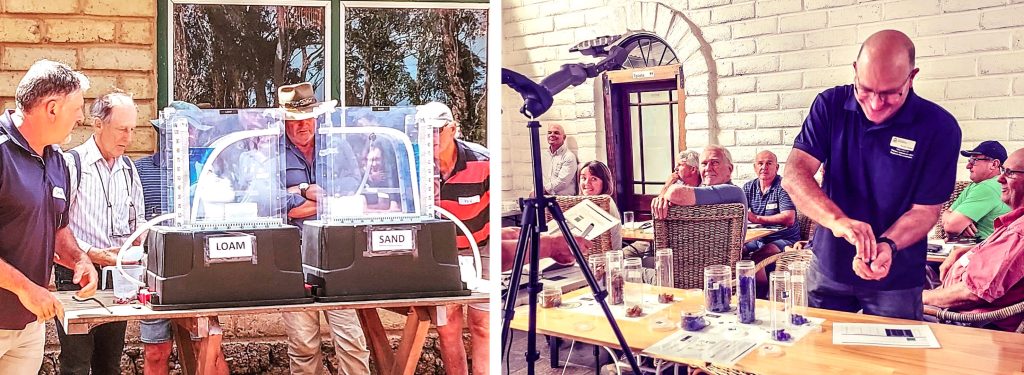 Local HEWA farmer participants were invited to receive their farm nutrient maps. These maps contain all of the data collected over the last year from soil sampling and tissue testing. The data showed what might be missing in their soil, but also where there may be leaching into water ways. Presenting the workshop were agronomists and representatives from DPIRD and DWER enabling the participants to:
Local HEWA farmer participants were invited to receive their farm nutrient maps. These maps contain all of the data collected over the last year from soil sampling and tissue testing. The data showed what might be missing in their soil, but also where there may be leaching into water ways. Presenting the workshop were agronomists and representatives from DPIRD and DWER enabling the participants to:
- Be more informed to make better fertiliser decisions by understanding the soil health of their farm.
- Saving them money by not using more product than is needed.
- Cutting back on excess fertilisers causing leaching into waterways
January 2023
Finalising HEWA post project surveys from 2021/22 and pre-project surveys 2022/23.
Collecting this data is crucial to the development of the Healthy Estuaries project.
The surveys capture data, that over time, can show changes in how decisions are made.
Such as
- Types of fertiliser used
- When they are used
- Amount of applications
- Spreader calibration
- Advice from independent agronomists
Link to Healthy Estuaries Torbay Inlet project page
December 2022
TCG hosted David Hardwick from Soil Land Food for a Soil Health workshop @ Torbay Hall on 6th December. Thanks for coming David!
Soil Wise is a collaborative project to help farmers and land managers improve their soil health and nutrient management. The aim is to promote best practice sustainable agriculture so that farmers can increase productivity and profitability, whilst protecting and improving the condition of natural resources.
November 2022
DIY Soil Sampling Training Day 15th November.
Thanks to the DPIRD officers who provided training on how to take accurate soil samples with a sampling drill and auger so that farmers could better understand their soil’s requirements, to save money on targeted soil improvements and increase productivity and reduce run-off into waterways.
June 2022
Community Science Forum
On Wednesday 29th June Community members were invited to learn about the latest science on the health of Torbay Inlet and its catchment at a free event in Elleker. The community forum included an introduction from TCG Chairperson Diane Evers and Healthy Estuaries WA Coordinator Jen Stritzke. There was an update from Dr Elke Reichwaldt on the latest water quality monitoring studies and an overview of on-ground actions to protect the inlet from TCG project manager Andrea Le Page.
Two local business operators Murray Gomm from Oranje Tractor and Keith Smith from Formosa Flora presented. Their presentations were unique, informative and entertaining. There were opportunities for community members to ask questions and to learn more about how they could get involved in improving the health of the Torbay Inlet and its catchment.
Expressions of Interest for 2022-2023 Soil sampling Year 3
In June expressions of interest for soil sampling 2022/23 under the Whole Farm, Nutrient Mapping program opened. Many applicants got in touch so that we could assist with property mapping and completing the online registration. It closed on 17th June with around 20 landholders registering to be involved.
Click here to watch an interview with one of our soil testing participants from the 2021 program.
Accu-Spread Field Day
On 14th June 4 spreaders and their farmers gathered on a local Torbay property. The Great Southern turned the weather on and Australia’s leading Accu-Spread specialist Russel Nichol demonstrated how we measure spreader throw rate and pattern. There was a lot of interest in the pattern produced by the 4 different spreaders and how machines can be adjusted/modified to get a better result.
Western Dairy video
A new series of videos has been produced by Western Dairy under the Dairy for Healthy Estuaries project, to promote practices and technologies for effluent management and showcase some of the DairyCare upgrade work.
Access the Western Dairy – YouTube video series here.
March 2022
Nutrient Mapping workshops
In March we were hoping to meet with farmers who had soil sampling done under the Whole Farm, Nutrient Mapping program, for a workshop to receive their soil test results and maps, however with the threat of COVID, we instead ran a series of Zoom workshops as well as a half day event in Elleker where some farmers could meet face to face whilst others could participate via Zoom. Well done to those who carried out their own DIY sampling. There were a number of informative presentations from DPIRD staff, and agronomists provided background and information to interpreting the maps showing nutrient status over the whole farm. Most participants have nominated an agronomist to help them develop appropriate fertilizer programs based on the soil test results.
December 2021
Soil sampling for Year 2
Soil sampling is now happening on the properties enrolled in Year 2 of the program. See here for a soil sampling video and what is happening right now in December and January for the catchments that are a part of the Healthy Estuaries WA.
Dairy for Healthy Estuaries- Denmark Demonstration Day
Late November DWER and Western Dairy organised a demonstration and discussion around the Code of Practise for Dairy Farm Effluent Management in WA at the Denmark Agricultural College. We looked at how the dairy is being managed to the revised standards and the review process used to benchmarks farms against the Code of Practise.
Preliminary surveys
During November and December we are conducting short interviews with all our new farmers to the program. Great opportunity to have a cuppa at the Cape Cafe and a chat afterwards.
DIY soil sampling @ Phil Hull’s
During November we hit the paddock to learn (in some cases) and refresh (in others) how to soil sample our own properties. Great presentation and direction by DPIRD staff on the day saw us walking and talking our way through a practical session. We also navigated our way through the use of our personal phones to collect and record that information. This is information is used to create nutrient mapping and fertiliser programs tailored to each unique property.
October 2021
Plant Tissue Sampling
During late September and early October we have been out with an agronomist collecting plant samples from properties. As part of the program, plants are tested for trace minerals and this information is used to look at the performance of paddocks, the fertiliser program and planning.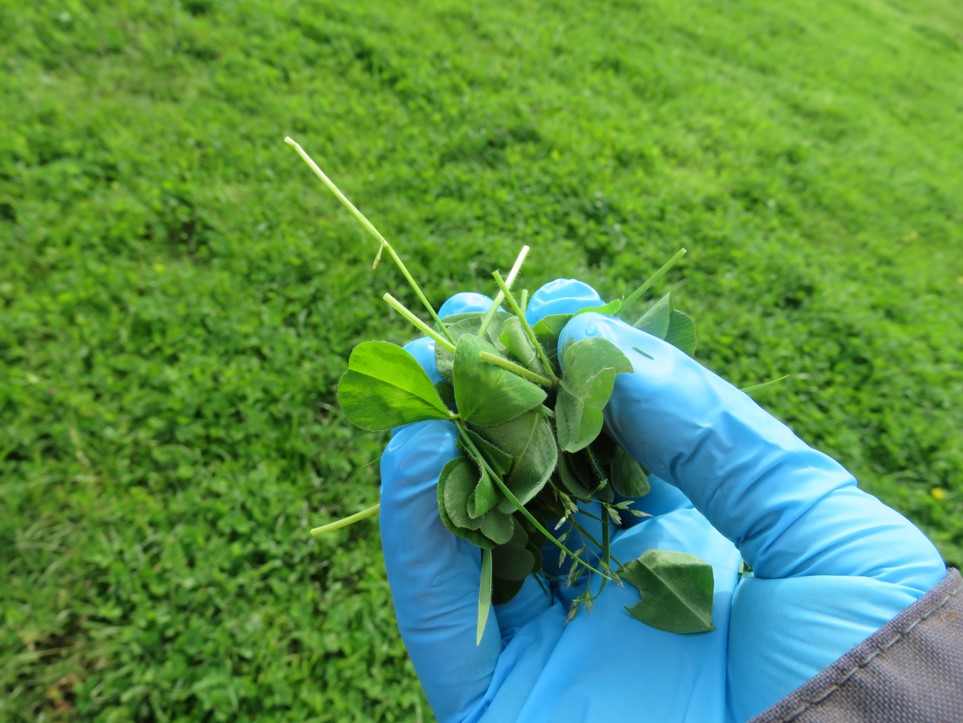
uPtake 21st September 2021
‘uPtake’ is a partnership project designed to improve nutrient use efficiency on grazing farms in South West Western Australia by improving farmer and industry of knowledge, confidence and uptake of the science supporting fertiliser recommendations.
On the 21st September Oyster Harbour Catchment Group, Wilson Catchment Committee, Torbay Catchment Group with The Department of Primary Industries and Regional Development and the Department of Water and Environmental Regulation hosted a field walk trial morning for all interested. A big breakfast on site to start the day followed by a presentation of the trial, data and discussion. For more information contact us or got to “uPtake” fertiliser trial – Oyster Harbour Catchment Group (ohcg.org.au) or Healthy Estuaries – Improving health of estuaries in WA (dwer.wa.gov.au)
Year 2 for Healthy Estuaries and new participants
17 properties across the Greater Torbay Catchment have registered to be involved in the program for Year 2. The mapping of properties is complete, paddock boundaries have been verified and the first of the soil sampling workshops happened online on the 22nd September. The next step is a short interview with our farmers and then onto soil sampling for the December/ January period.
August 2021
Expressions of Interest for 2021-2022 Soil sampling
In June expressions of interest for soil sampling 2021/22 under the Whole Farm, Nutrient Mapping program opened. It closed late July with 18 landholders registering to be involved.
March 2021
Fertilizing your mind at Nutrient Mapping workshops
In early March farmers who had soil sampling done under the Whole Farm, Nutrient Mapping program met at DPIRD for a workshop to receive their soil test results and maps. Well done to those who carried out their own DIY sampling. The mapping reports were complete with colour coded maps showing nutrient status over the whole farm. There were number of informative presentations from DPIRD staff, and agronomists provided background and information to interpreting the maps. There was a range of ‘scientific experiment’ style practical demonstrations aimed at explaining the relationship between soil properties, phosphorus levels and production. Most participants nominated an agronomist to help them develop appropriate fertilizer programs based on the soil test results.
These agronomists followed up with each of the participants to discuss their unique reports and potential fertiliser programs.
Thanks to our Project Partners:
Department of Water and Environmental Regulations

